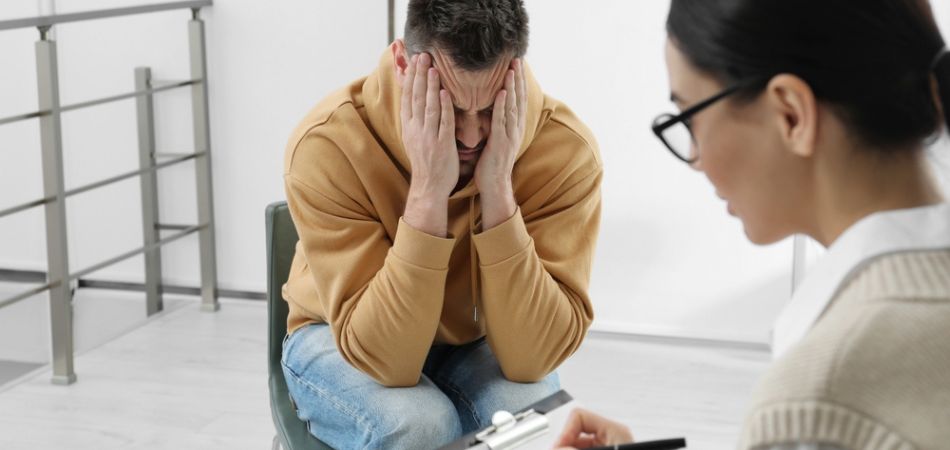
Written by:

Medically Reviewed by:
Last Updated:
June 9th, 2025
Drug Detox | Drug Withdrawal & Detox Timeline
- Select
- Drug addiction
- Drug detox
- Drug rehab
Drug detox is often shown in the media as some luxury spa break for the rich and famous but the truth is very different. If you are battling drug addiction, detox can be the first real step toward getting your life back. It is about giving your body a chance to reset, surrounded by people who know what they’re doing and want you to succeed. It’s completely normal to feel scared or anxious but understanding what detox really involves can give you the reassurance you need to get started.
What is drug detox?
Drug detox is the process of helping your body let go of its physical grip on drugs. Over time, your system can get so used to a substance that it feels impossible to cope without it. Medically planned and supported detox gently clears the drugs out in a safe way so your body can start to recover and you can start to feel more like yourself again.
Once drug detox is done, you will see major improvements in your mental and physical health. This will make you stronger and more focused for the subsequent rehab treatment phase. From there, you will continue your recovery through aftercare and be warmly welcomed into our Alumni Programme, an amazing community that always has your back.
The importance of drug detox
Starting your recovery with a proper drug detox in a place like Linwood House gives you the safest and strongest foundation. When you stop using drugs, your body can react in all sorts of ways, with some symptoms that are uncomfortable and others which can be really dangerous. These drug withdrawal symptoms can make you feel so overwhelmed that it’s tempting to start using again just to make them stop.
That’s why having trained professionals by your side is so important. From the moment you arrive at Linwood House, you will be supported by our team, who can help ease drug withdrawal symptoms, provide emotional reassurance and keep a close eye on your safety.
Here are some of the benefits of our drug detox programme:
- A full treatment path: After detox, you will move straight into drug rehab with access to a wide range of therapies and programmes to help you stay drug-free and rebuild.
- A calm and secure space: Our inpatient setting gives you a peaceful place for recovery with no outside pressure and no drugs available.
- Around-the-clock support: Day or night, our team is always nearby to help you manage drug withdrawal symptoms, answer questions or just offer a reassuring presence.
- Personalised care: We don’t do one-size-fits-all so your drug detox plan is based on a full assessment of your health, your history and what you need for safe, effective withdrawal.
Home drug detox vs inpatient drug detox
Trying to stop using drugs is always a step in the right direction. If you’re not fully dependent, drug detox at home might be enough to clear your head and break the habit, particularly for “mild” substances like cannabis. Lots of people who use drugs casually manage to stop this way and have better health and a happier life.
But if addiction has taken hold, drug detox at home can be risky. Drug withdrawal symptoms can hit hard and without medical help, it can get dangerous fast. In those cases, it’s much safer to go through drug detox somewhere like Linwood House, where trained staff are there around the clock.
Drug detox withdrawal symptoms to watch out for
Drug withdrawal can hit differently for everyone. Some people feel symptoms quickly, while others notice them creeping in over time. It all depends on your body and what kind of substances you’ve been using. To help you prepare, here’s a list of potential drug withdrawal symptoms:
- Anxiety
- Depression
- Irritability and mood swings
- Insomnia and disturbed sleep
- Drug cravings
- Sweating and fever
- Shaking or tremors
- Nausea and vomiting
- Diarrhoea or stomach cramps
- Muscle aches and pains
- Headaches
- Fatigue or low energy
- Paranoia or hallucinations
- Rapid heart rate or palpitations
- Seizures
- Confusion and disorientation
- Restlessness
- Goosebumps and chills
The typical drug detox timeline
It is not just specific drug withdrawal symptoms that vary but also how they progress and how long they last. Every drug has a different drug detox symptoms timeline but it usually looks something like this:
Drug detox myths busted
There are a lot of myths floating around about drug detox, and they can stop people from reaching out for help. So let’s clear a few things up:
Myth: Drug detox is just about willpower
Drug detox isn’t about “being strong enough”. Your body is going through real, physical withdrawal that often needs professional care to manage safely.
Myth: You only need drug detox if you’re using every day
Even if you only use drugs on weekends or during stressful times, you can still build up a physical dependence. Attempting drug detox at home alone can then be very dangerous.
Myth: If I’ve detoxed before and relapsed, I’ve failed
Relapse doesn’t mean you’ve failed, it just means you’re human. Many people go through several attempts before recovery sticks so what matters is getting up and trying again.
Myth: Detoxing from drugs is always dangerous
Some detoxes can be risky, especially with substances like benzos or opioids but that’s why professional help exists. With medical support, it’s a lot safer and more manageable than doing it alone.
Myth: You have to be at rock bottom before you get help
You don’t need to wait for your life to fall apart to get support. If drugs are affecting your health, relationships or peace of mind, that’s reason enough to start drug detox.
Detox from drugs with Linwood House today
If drugs have taken more from you than you ever meant to give, it’s time for a reset. At Linwood House, we offer personalised drug detox plans in a calm, caring space. Contact us today and let’s talk about how we can help you move forward.
Frequently asked questions
(Click here to see works cited)
- Diaper, Alison M., et al. “Pharmacological strategies for detoxification – PMC.” NCBI, https://www.ncbi.nlm.nih.gov/pmc/articles/PMC4014033/. Accessed 22 April 2025.
- Casarella, Jennifer. “Detox: How to Do It and Where.” WebMD, 7 June 2022, https://www.webmd.com/mental-health/addiction/addiction-detox-what-to-know. Accessed 22 April 2025.
- Albuquerque, Nuno. “Drug detox | Drug withdrawal & drug detox clinics | UKAT.” UK Addiction Treatment Centres, 5 December 2023, https://www.ukat.co.uk/detox/drug/. Accessed 22 April 2025.
- SAMHSA. “Detoxification and Substance Abuse Treatment.” NCBI, 2006, https://www.ncbi.nlm.nih.gov/books/NBK64119/. Accessed 22 April 2025.
Sanctuary Lodge. “Drug Detox | Withdrawal Symptoms and Treatment.” Sanctuary Lodge, https://www.sanctuarylodge.com/drug-detox/. Accessed 22 April 2025. - Sanctuary Lodge. “Drug Detox | Withdrawal Symptoms and Treatment.” Sanctuary Lodge, https://www.sanctuarylodge.com/drug-detox/. Accessed 22 April 2025.




